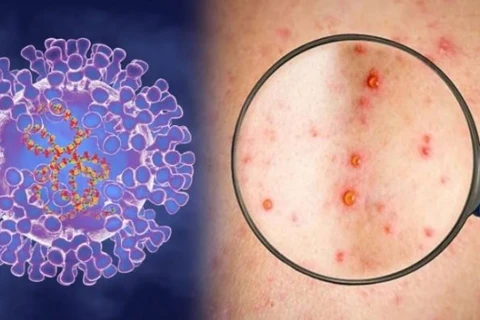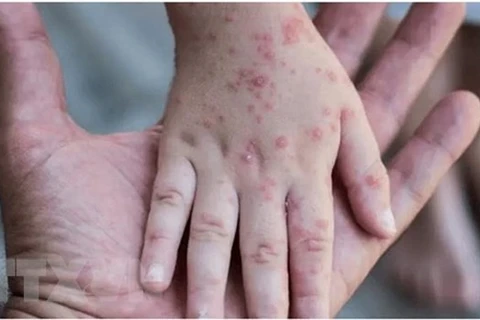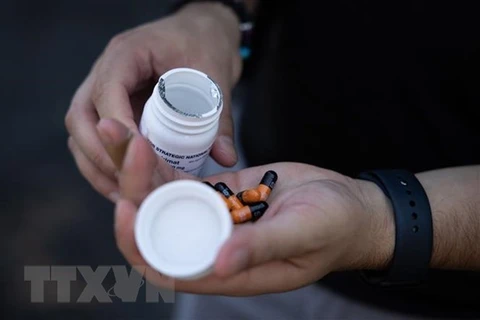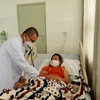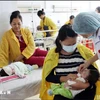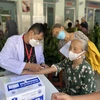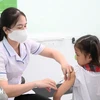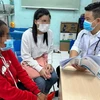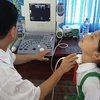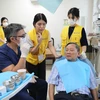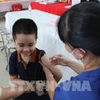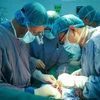Hanoi (VNA) - The Ministry of Health on August 22 issued temporary guidelines for monitoring and preventing monkeypox, amid complicated disease developments.
Accordingly, people have their temperatures checked at border gates to detect cases of monkeypox.
Monitoring measures at border gates also include the deployment of supervising medical quarantine officers.
People with suspected symptoms will be placed into temporary isolation for further testing and transferred to medical facilities for treatment when necessary, or they will have to self-monitor their health over 21 days from the date of entry.
People who enter Vietnam from countries or regions with cases of the disease are also required to self-monitor for 21 days, and those displaying symptoms such as a rash, headache, fever, chills, sore throat, malaise, fatigue or swollen lymph nodes should attend a medical facility immediately.
The ministry also requested increased community and health facilities surveillance to detect suspected cases.
To prevent monkeypox from spreading, it is recommended to avoid close contact with people who have or are suspected of having the disease; and frequently wash hands with soap and clean water or hand sanitiser, among other measures.
Monkeypox is a zoonotic viral disease, meaning that it is transmitted from infected animals to humans.
The disease can spread to people when they come into physical contact with an infected animal. Monkeypox is commonly found in central and west Africa, where there are tropical rainforests and where animals that may carry the virus typically live.
Human-to-human transmission can occur via face-to-face exposure, direct physical contact, sexual contact, or contact with contaminated materials such as clothing or bedding.
The illness begins like many acute viral diseases, with fever (>38.5 degrees Celsius), headache, muscle aches, backache, swollen lymph nodes, and extreme fatigue. After 1 to 3 days, the patient develops a rash, which often begins on the face, and then spreads to other parts of the body.
The rashes then develop into lesions. Lesions can be flat or slightly raised, filled with clear or yellowish fluid, and then crust, dry up and fall off. Symptoms typically last between 2 to 4 weeks and go away on their own without treatment.
On July 23, Director-General of the World Health Organisation (WHO) Tedros Adhanom Ghebreyesus declared monkeypox a global public health emergency due to its rapid transmission rate and the risk of its spread further to other countries.
As of August 15, WHO had recorded over 35,000 monkeypox cases in 92 countries and territories, including those close to Vietnam, such as Thailand, Singapore, the Republic of Korea, China, and Japan. Twelve people have died. Typical symptoms of the disease include fever, headache, muscle pain, skin lesions and rashes. It is transmitted through contact with bodily fluids or lesions.
As of August 21, Vietnam had not recorded any cases of monkeypox. However, earlier this month, Prime Minister Pham Minh Chinh instructed the People’s Committees of the country’s 63 cities and provinces to issue instructions on the prevention and control of monkeypox immediately.
Supervision should be tightened at border gates and among the community, the PM said, stressing that drugs, equipment, human resources and finance should be available to implement preventive measures and patient treatment.
He urged municipal and provincial People’s Committees to implement plans and scenarios, organise training courses for health workers, diversify communication methods, and establish hotlines.
The Ministry of Health should closely watch the situation to take suitable measures and quickly deal with monkeypox clusters, with attention paid to health workers and vulnerable groups.
The ministry was also asked to set out a plan in response to the disease, perfect professional guidelines, improve its testing and diagnosis capacity, and instruct and inspect localities in monkeypox prevention and control.
Meanwhile, the Ministry of Agriculture and Rural Development should coordinate with the health sector and agencies to prevent infection from wild animals./.
Accordingly, people have their temperatures checked at border gates to detect cases of monkeypox.
Monitoring measures at border gates also include the deployment of supervising medical quarantine officers.
People with suspected symptoms will be placed into temporary isolation for further testing and transferred to medical facilities for treatment when necessary, or they will have to self-monitor their health over 21 days from the date of entry.
People who enter Vietnam from countries or regions with cases of the disease are also required to self-monitor for 21 days, and those displaying symptoms such as a rash, headache, fever, chills, sore throat, malaise, fatigue or swollen lymph nodes should attend a medical facility immediately.
The ministry also requested increased community and health facilities surveillance to detect suspected cases.
To prevent monkeypox from spreading, it is recommended to avoid close contact with people who have or are suspected of having the disease; and frequently wash hands with soap and clean water or hand sanitiser, among other measures.
Monkeypox is a zoonotic viral disease, meaning that it is transmitted from infected animals to humans.
The disease can spread to people when they come into physical contact with an infected animal. Monkeypox is commonly found in central and west Africa, where there are tropical rainforests and where animals that may carry the virus typically live.
Human-to-human transmission can occur via face-to-face exposure, direct physical contact, sexual contact, or contact with contaminated materials such as clothing or bedding.
The illness begins like many acute viral diseases, with fever (>38.5 degrees Celsius), headache, muscle aches, backache, swollen lymph nodes, and extreme fatigue. After 1 to 3 days, the patient develops a rash, which often begins on the face, and then spreads to other parts of the body.
The rashes then develop into lesions. Lesions can be flat or slightly raised, filled with clear or yellowish fluid, and then crust, dry up and fall off. Symptoms typically last between 2 to 4 weeks and go away on their own without treatment.
On July 23, Director-General of the World Health Organisation (WHO) Tedros Adhanom Ghebreyesus declared monkeypox a global public health emergency due to its rapid transmission rate and the risk of its spread further to other countries.
As of August 15, WHO had recorded over 35,000 monkeypox cases in 92 countries and territories, including those close to Vietnam, such as Thailand, Singapore, the Republic of Korea, China, and Japan. Twelve people have died. Typical symptoms of the disease include fever, headache, muscle pain, skin lesions and rashes. It is transmitted through contact with bodily fluids or lesions.
As of August 21, Vietnam had not recorded any cases of monkeypox. However, earlier this month, Prime Minister Pham Minh Chinh instructed the People’s Committees of the country’s 63 cities and provinces to issue instructions on the prevention and control of monkeypox immediately.
Supervision should be tightened at border gates and among the community, the PM said, stressing that drugs, equipment, human resources and finance should be available to implement preventive measures and patient treatment.
He urged municipal and provincial People’s Committees to implement plans and scenarios, organise training courses for health workers, diversify communication methods, and establish hotlines.
The Ministry of Health should closely watch the situation to take suitable measures and quickly deal with monkeypox clusters, with attention paid to health workers and vulnerable groups.
The ministry was also asked to set out a plan in response to the disease, perfect professional guidelines, improve its testing and diagnosis capacity, and instruct and inspect localities in monkeypox prevention and control.
Meanwhile, the Ministry of Agriculture and Rural Development should coordinate with the health sector and agencies to prevent infection from wild animals./.
VNA

